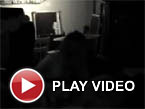Circuit Des Yeux, "In Plain Speech"
 Haley Fohr's Thrill Jockey debut finds her again returning to the idiosyncratic singer-songwriter vein that first surfaced on 2013's Overdue.  There is a new twist though: Fohr is now backed by a full band of Chicago music scene luminaries in additional to returning collaborator Cooper Crain (of Bitchin Bajas).  The result is quite a strange, kaleidoscopic, and temporally dislocated one, drifting from inspired experimentalism to '70s-style folk-rock to something resembling Diamanda Galas fronting a Led Zeppelin cover band.  Personally, I vastly prefer her experimental side ("Dream of TV" is absolutely stellar), but there is no denying the singular power and otherness of Fohr's voice.
Haley Fohr's Thrill Jockey debut finds her again returning to the idiosyncratic singer-songwriter vein that first surfaced on 2013's Overdue.  There is a new twist though: Fohr is now backed by a full band of Chicago music scene luminaries in additional to returning collaborator Cooper Crain (of Bitchin Bajas).  The result is quite a strange, kaleidoscopic, and temporally dislocated one, drifting from inspired experimentalism to '70s-style folk-rock to something resembling Diamanda Galas fronting a Led Zeppelin cover band.  Personally, I vastly prefer her experimental side ("Dream of TV" is absolutely stellar), but there is no denying the singular power and otherness of Fohr's voice.
Haley Fohr is the quintessential Artist That I Do Not Understand At All, which I suppose is what keeps me coming back to her work: I might not always like what she does, but I vastly prefer being puzzled to being bored.  For example, the Circuit Des Yeux albums before Overdue were largely experimental and instrumental, making little use of Fohr's incredibly haunting, unique, and powerful voice.  Now, with In Plain Speech, she is largely repressing her previous experimental tendencies to make a somewhat straightforward "rock" album, except that it actually sounds like a fantasia on four or five different albums from the '70s rather than like anything happening now.  That said, she also sometimes sounds incredibly contemporary or betrays her background in ethnomusicology–the cryptic, feminist first single "Do The Dishes" sounds an awful lot like a Sublime Frequencies' Thailand compilation before the singing comes in.  I never know exactly where she is coming from or why she is choosing to come from there.  Essentially, the entire album is just a whole lot of disparate things bizarrely colliding together or the proverbial square peg relentlessly, inexplicably trying to fit into a round hole (best exemplified by the bombastic, yodeling vocal pyrotechnics at the end of the subdued folk rock of "A Story of This World").
The best analogy that I can come up with for In Plain Speech is that it is like watching someone learning how to use a rocket launcher: every fresh attempt is certainly a compelling display of force, but the target is hit only rarely.  While there are ostensibly nine songs, a third of them ("KT 1," "KT 5," and "Guitar Knife") are very brief (if likable) instrumentals.  Then another four pieces find Fohr and her band trying on various classic rock guises with varying degrees of success, ranging from quasi-operatic hard rock ("Ride Blind") to mellow Eastern-tinged psychedelia ("In The Late Afternoon").  There plenty of fine performances and explosive crescendos scattered about, but the bulk of the album is just too chameleonic, too bombastic, and too "rock" for me to like almost any pieces in their entirety.  I often found myself wondering who this album could possibly be for, as it is variously deeply personal, wildly over-the-top, and unable to ever fully commit to any one clear aesthetic.  It admittedly works as a show of force, but I just could not connect with anything that was happening on any kind of deep level.
There is, however, one notable exception: the nearly 8-minute centerpiece "Dream of TV."  Beginning with gently plucked viola, the piece gradually becomes a beautifully arranged reverie of quavering flutes, guitar noise, melancholy strings, and hallucinatory electronic chaos…and then the drums come in alongside Fohr’s beautifully warbling, wordless vocals and it transforms from merely great to absolutely sublime.  I also like "Do The Dishes" quite a bit, but it is primarily "Dream of TV" that highlights the amazing potential that Fohr has when surrounded by appropriately sympathetic and talented collaborators.  I suppose the unfortunate downside is that "TV" unintentionally highlights the shortcomings of the rest of the album, but it is also the first clear evidence that Haley can be a great composer in addition to being a powerful and unique voice. Ultimately, In Plain Speech is still a mostly flawed (or at least deeply perplexing) album, but it is one that boasts one of the finest songs that I have heard this year.
 
 
 



